|
Books Should Be Free Loyal Books Free Public Domain Audiobooks & eBook Downloads |
|
|
Books Should Be Free Loyal Books Free Public Domain Audiobooks & eBook Downloads |
|
War Stories |
|---|
|
Book type:
Sort by:
View by:
|
By: Tobias Smollett (1721-1771) | |
|---|---|
 Adventures of Roderick Random
Adventures of Roderick Random
I am Roderick Random. This is the contemporary story of my struggle against the adversity of orphan-hood, poverty, press gangs, bloody duels, rival fortune hunters, and the challenge to be well-dressed through it all. In the course of recounting my adventures to you, dear reader, I will give you a front row seat to the characters of English eighteenth century life including highway robbers, womanizing monks, debt-laden gallants, lecherous corrupt officials, effeminate sea captains, bloodthirsty surgeons, and my dear friend Miss Williams, a reformed prostitute... | |
By: Louis Joseph Vance (1879-1933) | |
|---|---|
 The False Faces
The False Faces
This is the second book in the Lone Wolf series. Michael Lanyard had turned his back on his career as gentleman-thief and started a respectable life, when World War I wrecks his life. With his family dead and the spy Ekstrom alive after all, his special skills as the Lone Wolf are needed once more, this time in the war behind enemy lines. But again, there is a mysterious woman involved... | |
By: Fa'iz El-Ghusein (1883-1968) | |
|---|---|
 Martyred Armenia
Martyred Armenia
This is a first hand account of the Armenian Genocide written by a Syrian who had been a Turkish official for three and a half years. His accounts tell of the worst of humanity, and also of the noblest. The noble include families who courageously support each other in the face of death, and Turks who refuse to follow orders to kill, knowing that they shall be executed themselves for their defiance. | |
By: Byron A. Dunn (1842-1926) | |
|---|---|
 Raiding with Morgan
Raiding with Morgan
It is a fictional tale of cavalry actions during the U.S. Civil War, under General John Morgan. | |
By: Johanna Brandt (1876-1964) | |
|---|---|
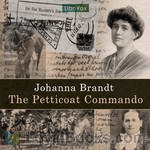 The Petticoat Commando
The Petticoat Commando
In introducing the English version of this book I venture to bespeak a welcome for it, not only for the light which it throws on some little-known incidents of the South African war, but also because of the keen personal interest of the events recorded. It is more than a history. It is a dramatic picture of the hopes and fears, the devotion and bitterness with which some patriotic women in Pretoria watched and, as far as they could, took part in the war which was slowly drawing to its conclusion on the veld outside... | |
By: Willis J. Abbot (1863-1934) | |
|---|---|
 Aircraft and Submarines
Aircraft and Submarines
"Aircraft and Submarines" is a history of the development of these forms of transportation and their ultimate use in warfare. Also a brief history of submarine use in commercial applications. A thoroughly enjoyable piece for anyone interested in the detailed development of these modes of transportation. | |
By: William Tecumseh Sherman (1820-1891) | |
|---|---|
 Sherman’s Recollections of California, 1846-1848, 1855-1857, from his Memoirs
Sherman’s Recollections of California, 1846-1848, 1855-1857, from his Memoirs
This librivox recording comprises three chapters from American Civil War General William Tecumseh Sherman’s Memoirs. The chapters deal with a posting to California in his pre-Civil War military career in the years 1846-1848. While many of his colleagues saw action in the Mexican-American War, Sherman performed administrative duties in the captured territory of California. Along with fellow Lieutenants Henry Halleck and Edward Ord, Sherman embarked from New York on the 198-day journey around Cape Horn aboard the converted sloop USS Lexington... | |
By: Joseph Plumb Martin (1760-1850) | |
|---|---|
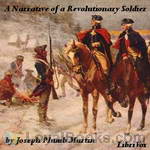 A Narrative of a Revolutionary Soldier
A Narrative of a Revolutionary Soldier
Joining the Continental Army as a teenager, Joseph Plumb Martin spent the next eight years fighting in the Revolutionary War as an enlisted man. His memoirs tell in detail his experiences during that time...the bitter cold, hunger, loss of life, long marches, and fear of battle. He also includes tales of fishing, hunting, and other activities...including encounters with a "saucy miss". His narrative reveals much about American life at the time and is one of the fullest and best accounts of the Revolutionary War, presented from a private's point of view.The book has been later republished under the names Private Yankee Doodle and Memoir of a Revolutionary Soldier. | |
By: May Sinclair (1863-1946) | |
|---|---|
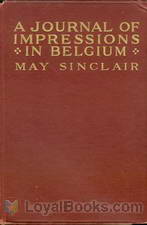 Journal of Impressions in Belgium
Journal of Impressions in Belgium
In 1914, at the age of 51, the novelist and poet May Sinclair volunteered to leave the comforts of England to go to the Western Front, joining the Munro Ambulance Corps ministering to wounded Belgian soldiers in Flanders. Her experiences in the Great War, brief and traumatizing as they were, permeated the prose and poetry she wrote after this time. Witness of great human pain and tragedy, Sinclair was in serious danger of her life on multiple occasions. This journal makes no attempt to be anything more than a journal: a lucid, simple, heart-breaking account of war at first hand. | |
By: Francis Key Howard (1826-1872) | |
|---|---|
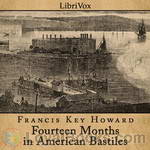 Fourteen Months in American Bastiles
Fourteen Months in American Bastiles
Francis Key Howard recounts in this book his life as a political prisoner of the United States. He points out that he was held captive at the same location where his grandfather was inspired to write the national anthem about the "land of the free," which makes a very stunning contrast. The sufferings that were imposed on him by the Union forces had the effect of solidifying his determination to resist unjust governmental dictates. (Introduction by Katie Riley) | |
By: A. E. W. Mason (1865-1948) | |
|---|---|
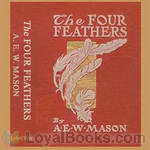 The Four Feathers
The Four Feathers
The Four Feathers is a 1902 adventure novel by British writer A.E.W. Mason that has inspired many films of the same title.The novel tells the story of British officer, Harry Feversham, who resigns his commission in the East Surrey Regiment just prior to Sir Garnet Wolseley's 1882 expedition to Egypt to suppress the rising of Urabi Pasha. He is faced with censure from three of his comrades for cowardice, signified by the delivery of three white feathers to him, from Captain Trench and Lieutenants Castleton and Willoughby, and the loss of the support of his Irish fiancée, Ethne Eustace, who presents him with the fourth feather... | |
By: Robert Henry Newell (1836-1901) | |
|---|---|
 The Orpheus C. Kerr Papers
The Orpheus C. Kerr Papers
These are a collection of humorous "letters" written by a fictional character to a relation in the north during the Civil War. They were published regularly in the New York Mercury Sunday newspaper for the four years of the war. In the letters, Newell pokes fun at northern generals, politicians, and has hard things to say about southerners. Although Newell is rarely serious, I imagine the letters reflect the bitterness and frustration of many northerners at the time. (Introduction by Margaret) | |
By: Jefferson Davis (1808-1889) | |
|---|---|
 Rise and Fall of the Confederate Government, Volume 1a
Rise and Fall of the Confederate Government, Volume 1a
The Rise and Fall of the Confederate Government (1881) is written by Jefferson Davis, former President of the Confederate States of America during the American Civil War. Davis wrote the book as a straightforward history of the Confederate States of America and as an apologia for the causes that he believed led to and justified the American Civil War. Davis spared little detail in describing every aspect of the Confederate constitution and government, in addition to which he retold in detail numerous military campaigns... | |
By: US Office of Civil Defense | |
|---|---|
 In Time Of Emergency: A Citizen's Handbook On Nuclear Attack, Natural Disasters
In Time Of Emergency: A Citizen's Handbook On Nuclear Attack, Natural Disasters
A major emergency affecting a large number of people may occur anytime and anywhere. It may be a peacetime disaster such as a flood, tornado, fire, hurricane, blizzard or earthquake. It could be an enemy nuclear attack on the United States. In any type of general disaster, lives can be saved if people are prepared for the emergency, and know what actions to take when it occurs. This handbook, "In Time of Emergency" (1968), contains basic general information on both nuclear attack and major natural disasters... | |
By: Philip Gibbs (1877-1962) | |
|---|---|
 Now It Can Be Told
Now It Can Be Told
In this book I have written about some aspects of the war which, I believe, the world must know and remember, not only as a memorial of men's courage in tragic years, but as a warning of what will happen again--surely--if a heritage of evil and of folly is not cut out of the hearts of peoples. Here it is the reality of modern warfare not only as it appears to British soldiers, of whom I can tell, but to soldiers on all the fronts where conditions were the same... The purpose of this book is to get... | |
By: Philip Francis Nowlan (1888-1940) | |
|---|---|
 Airlords of Han
Airlords of Han
Airlords of Han is the 2nd Buck Rogers story, the sequel to Armageddon 2419 A.D.. Anthony Rogers takes the fight to free 25th Century America to the Han overlords. From the March, 1929 issue of Amazing Stories. | |
By: Frederick A. Talbot (1880-?) | |
|---|---|
 Aeroplanes and Dirigibles of War
Aeroplanes and Dirigibles of War
"Aeroplanes and Dirigibles of War" is an interesting read of the beginnings of air warfare in World War I. Anyone interested in early aviation and armament will find this a fascinating work. By William Tomcho. | |
By: William Allison Sweeney | |
|---|---|
 History of the American Negro
History of the American Negro
History Of The American Negro In The Great World WarHis Splendid Record In The Battle Zones Of Europe By W. Allison Sweeney Contributing Editor Of The Chicago Defender. CHAPTER I. SPIRITUAL EMANCIPATION OF NATIONS. The march of civilization is attended by strange influences. Providence which directs the advancement of mankind, moves in such mysterious ways that none can sense its design or reason out its import. Frequently the forces of evil are turned to account in defeating their own objects. Great tragedies, cruel wars, cataclysms of woe, have acted as enlightening and refining agents... | |
By: Alexander Aaronsohn (1888-1948) | |
|---|---|
 With the Turks in Palestine
With the Turks in Palestine
While Belgium is bleeding and hoping, while Poland suffers and dreams of liberation, while Serbia is waiting for redemption, there is a little country the soul of which is torn to pieces—a little country that is so remote, so remote that her ardent sighs cannot be heard.It is the country of perpetual sacrifice, the country that saw Abraham build the altar upon which he was ready to immolate his only son, the country that Moses saw from a distance, stretching in beauty and loveliness,—a land of promise never to be attained,—the country that gave the world its symbols of soul and spirit... | |
By: James Brendan Connolly (1868-1957) | |
|---|---|
 The U-Boat Hunters
The U-Boat Hunters
The author takes the listener on a tour of various ships used in WW1. He discusses the boats and the seamen who occupy them and their encounters with the German U-boats. It is a collection of short stories, each one complete, about them all. The author was also an Olympic athlete; winning a bronze, silver and gold medal in the Athens Olympics of 1896 and a silver in the Paris games of 1900. | |
By: Alice Turner Curtis (1863-??) | |
|---|---|
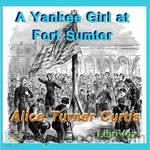 A Yankee Girl at Fort Sumter
A Yankee Girl at Fort Sumter
Sylvia Fulton is a ten-years-old girl from Boston who stayed in Charleston, South Carolina, before the opening of the civil war. She loves her new home, and her dear friends. However, political tensions are rising, and things start to change. Through these changes, Silvia gets to know the world better: from Estrella, her maid, she starts to understand what it is to be a slave, from her unjust teacher she learns that not all beautiful people are perfect, and from the messages she carries to Fort Sumter she learns what is the meaning of danger. However, this is a lovely book, written mostly for children. | |
By: Nellie McClung (1873-1951) | |
|---|---|
 Three Times and Out
Three Times and Out
The true story of M. C. Simmons, a Canadian soldier captured by the German Army during the early days of World War I. We read of his sixteen months of imprisonment, his encounters with other captured troops of the other Allied armies and his observations of the nature of his captors and their countrymen. Most compellingly we read of his escape from POW camp, his recapture and punishment, and then the capture and punishment following his second escape attempt, climaxing in his third escape attempt and daring travel through enemy territory against all odds... | |
By: Lady Sarah Wilson (1865-1929) | |
|---|---|
 South African Memories
South African Memories
Lady Sarah Isabella Augusta Wilson was the aunt of Winston Spencer Churchill. In 1899 she became the first woman war correspondent when she was recruited to cover the Siege of Mafeking for the Daily Mail during the Boer War. She moved to Mafeking with her husband at the start of the war, where he was aide-de-camp to Colonel Robert Baden-Powell. Baden-Powell asked her to leave Mafeking for her own safety after the Boers threatened to storm the British garrison. This she duly did, and set off on a... | |
By: Mary Seacole (1805-1881) | |
|---|---|
 Wonderful Adventures of Mrs. Seacole in Many Lands
Wonderful Adventures of Mrs. Seacole in Many Lands
I should have thought that no preface would have been required to introduce Mrs. Seacole to the British public, or to recommend a book which must, from the circumstances in which the subject of it was placed, be unique in literature. If singleness of heart, true charity, and Christian works; if trials and sufferings, dangers and perils, encountered boldly by a helpless woman on her errand of mercy in the camp and in the battle-field, can excite sympathy or move curiosity, Mary Seacole will have many friends and many readers... | |
By: Francis Andrew March (1863-1926) | |
|---|---|
 History of the World War
History of the World War
This is a popular narrative history of the world's greatest war. Written frankly from the viewpoint of the United States and the Allies, it visualizes the bloodiest and most destructive conflict of all the ages from its remote causes to its glorious conclusion and beneficent results.Two ideals have been before us in the preparation of this necessary work. These are simplicity and thoroughness. It is of no avail to describe the greatest of human events if the description is so confused that the reader loses interest... | |
By: Lily Dougall (1858-1923) | |
|---|---|
 Mermaid
Mermaid
"'What a fool I was not to go where she beckoned!' mused Caius. 'Where? Anywhere into the heart of the ocean, out of this dull, sordid life into the land of dreams.' For it must all have been a dream—a sweet, fantastic dream, imposed upon his senses by some influence, outward or inward; but it seemed to him that at the hour when he seemed to see the maid it might have been given him to enter the world of dreams, and go on in some existence which was a truer reality than the one in which he now was... | |
By: Sir Edward Shepherd Creasy (1812-1878) | |
|---|---|
 Fifteen Decisive Battles of the World
Fifteen Decisive Battles of the World
This work is Edward Creasy's best known fundamental work of history. It describes in detail 15 battles of world history, beginning with the Battle of Marathon of 490 BC and ending with the Battle of Waterloo of 1815. Each chapter is illustrated with rich historical detail and a timeline of events. | |
By: George Bethune English (1787-1828) | |
|---|---|
 A Narrative of the Expedition to Dongola and Sennaar
A Narrative of the Expedition to Dongola and Sennaar
As a second lieutenant in the United States Marine Corps during the War of 1812 assigned to Marine Corps headquarters, English sailed to the Mediterranean, and was among the first citizens of the United States known to have visited Egypt. Shortly after arriving in Egypt he resigned his commission, converted to Islam and joined Isma'il Pasha in an expedition up the Nile River against Sennar in 1820, winning distinction as an officer of artillery. He published his Narrative of the Expedition to Dongola and Sennaar (London 1822) regarding his exploits. (Introduction adapted by obform from Wikipedia) | |
By: Robert Sidney Bowen (1900-1977) | |
|---|---|
 Dave Dawson on Guadalcanal
Dave Dawson on Guadalcanal
One of a series of youth-oriented adventure books set in contemporary WWII era, featuring fictional American flying ace, Dave Dawson. | |
By: Frances Swain | |
|---|---|
 Food Guide for War Service at Home
Food Guide for War Service at Home
"The long war has brought hunger to Europe; some of her peoples stand constantly face to face with starvation. To meet all this great food need in Europe—and meeting it is an imperative military necessity—we must be very careful and economical in our food use here at home. We must eat less; we must waste nothing; we must equalize the distribution of what food we may retain for ourselves; we must prevent extortion and profiteering which make prices so high that the poor cannot buy the food they actually need; and we must try to produce more food... | |
By: Boyd Cable (1878-1943) | |
|---|---|
 Between the Lines
Between the Lines
This book, all of which has been written at the Front within sound of the German guns and for the most part within shell and rifle range, is an attempt to tell something of the manner of struggle that has gone on for months between the lines along the Western Front, and more especially of what lies behind and goes to the making of those curt and vague terms in the war communiqués. I think that our people at Home will be glad to know more, and ought to know more, of what these bald phrases may actually signify, when, in the other sense, we read 'between the lines.' | |
By: Archibald Forbes (1838-1900) | |
|---|---|
 The Afghan Wars 1839-42 and 1878-80, Part 1
The Afghan Wars 1839-42 and 1878-80, Part 1
The First Anglo–Afghan War was fought between British India and Afghanistan from 1839 to 1842. It was one of the first major conflicts during the Great Game, the 19th century competition for power and influence in Central Asia between the United Kingdom and Russia, and also marked one of the worst setbacks inflicted on British power in the region after the consolidation of British Raj by the East India Company. | |